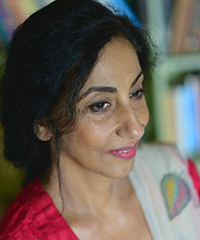Faculty Profile
Dr. Syeedda Anjum Ara Alvi
Visiting Faculty
Department Of Humanities & Social Sciences
Anjum Alvi, a cultural anthropologist, received her PhD in 1999 from the Free University of Berlin, where she taught for 18 years. She also taught at South Asia Institute of the University of Heidelberg as well as at the Institute of Sociology of the Technical University of Darmstadt, Germany. Since December 2008 she teaches in Pakistan at the Lahore University of Management Sciences. She tries to relate anthropological perspectives of authors, like, Marcel Mauss, Louis Dumont, Marilyn Strathern, Pierre Bourdieu, Walter Benjamin etc. to philosophical ones such as those of Ludwig Wittgenstein, Emmanuel Levinas, Maurice Merleau-Ponty, Alasdair MacIntyre, Michel Foucault, and Denis de Rougemont. In her publications, she attempts to develop a theory which encompasses a subjective and objective perspective at the same time. To this end of demonstrating the inseparability of these two perspectives she worked and published in different fields of anthropology. She examines cultural fragments in relation to their place in the larger picture of that cultural context. Instead of emphasizing mere differences or similarities, she searches for transforming patterns between cultural contexts, and points out challenges we face in relating cultural contexts intersubjectively.
Teaching and Research Interests
In her over two decades of teaching she developed 44 courses on different topics: Ethics and morality, kinship, Marcel Mauss, Louis Dumont, economic anthropology, Muslim veiling, self and person, emotions, body, death, religion, ritual, gender, Pope John Paul II, modernity, symbol theory, history and theory of anthropology. Regionally she concentrates on South Asia, particularly the Punjab, as well as social contexts of Europe, like Muslim diasporas.
Publications
2020. Levinas and ethics: The death of Pope John Paul II. Anthropological Theory Vol. 20(2): 157–179.
2016. Comment: Tessa Verhallen’s article “Tuning to the dance of ethnography”: ethics during situated fieldwork in single-mother child protection families”. Current Anthropology 57(4): 465- 466.
2013. Concealment and revealment: The Muslim veil in context. Current Anthropology 55(2): 177–199.
2010. Gifts at Marriage in the Muslim Punjab. In An Anthropology of Values: Festschrift in honour of Georg Pfeffer, edited by P. Berger, R. Hardenberg, Ellen Kattner, M. Prager 19-48. India: Dorling Kindersley.
2007. India and the Muslim Punjab: A Unified Approach to South Asian Kinship. Journal of Royal Anthropological Institute 13(3): 657-678.
2001. The Category of the Person in Rural Punjab. Social Anthropology 9(1): 45-63.
1999. Bearers of grief: death, women, gifts, and kinship in Muslim Punjab. Berlin: Free University, Ph.D. dissertation, Microfiche edition.
PhD thesis involves a comparative theoretical discussion of the perspectives of Pierre Bourdieu and Louis Dumont and their analytical approaches to kinship which I utilized to approach the social condition of the Pakistani Punjab. The thesis focuses on marriage, the brother-sister relationship, gender relations, gift-exchange and the concept of gift, exemplified most extensively by the mortuary ritual.
